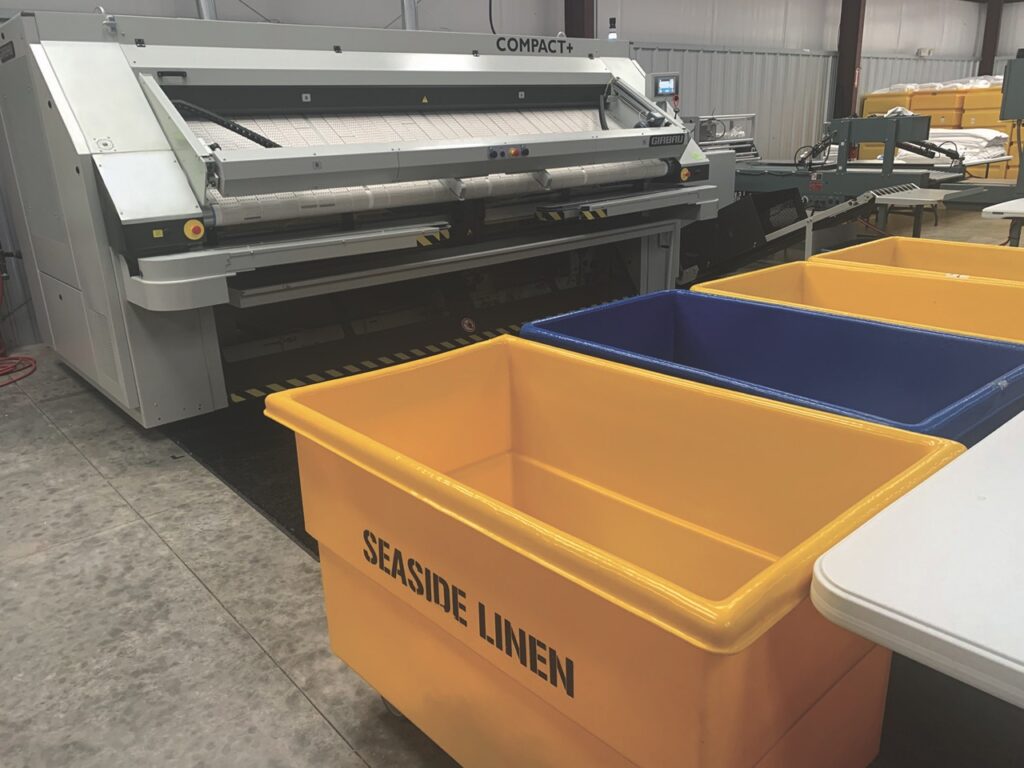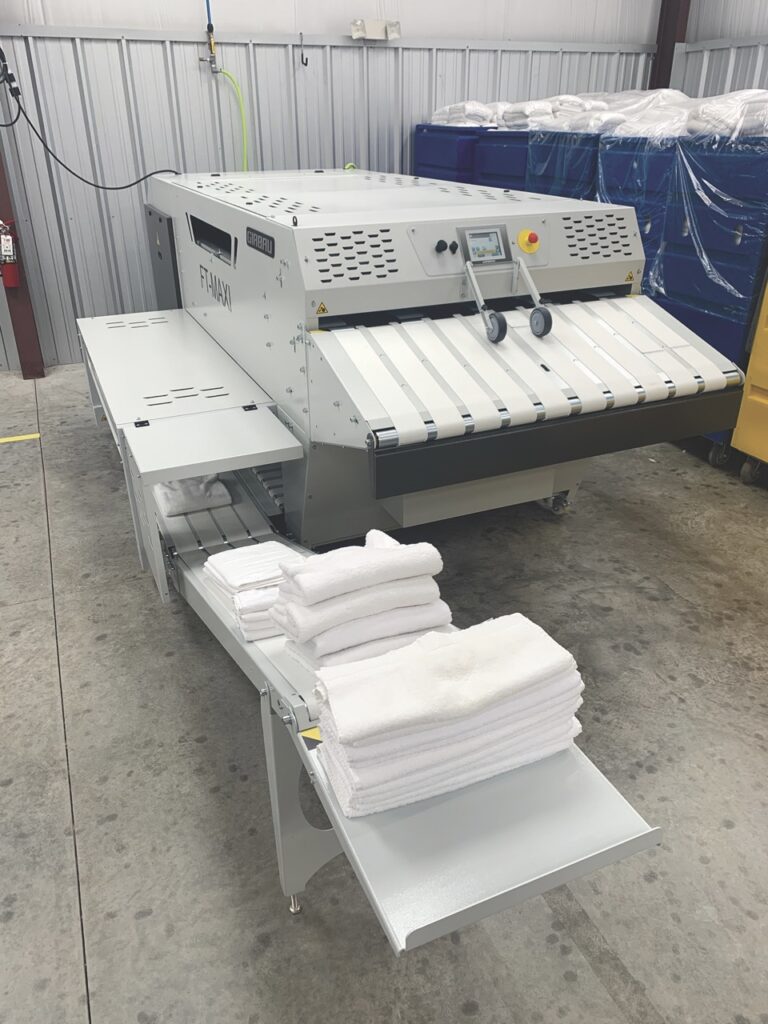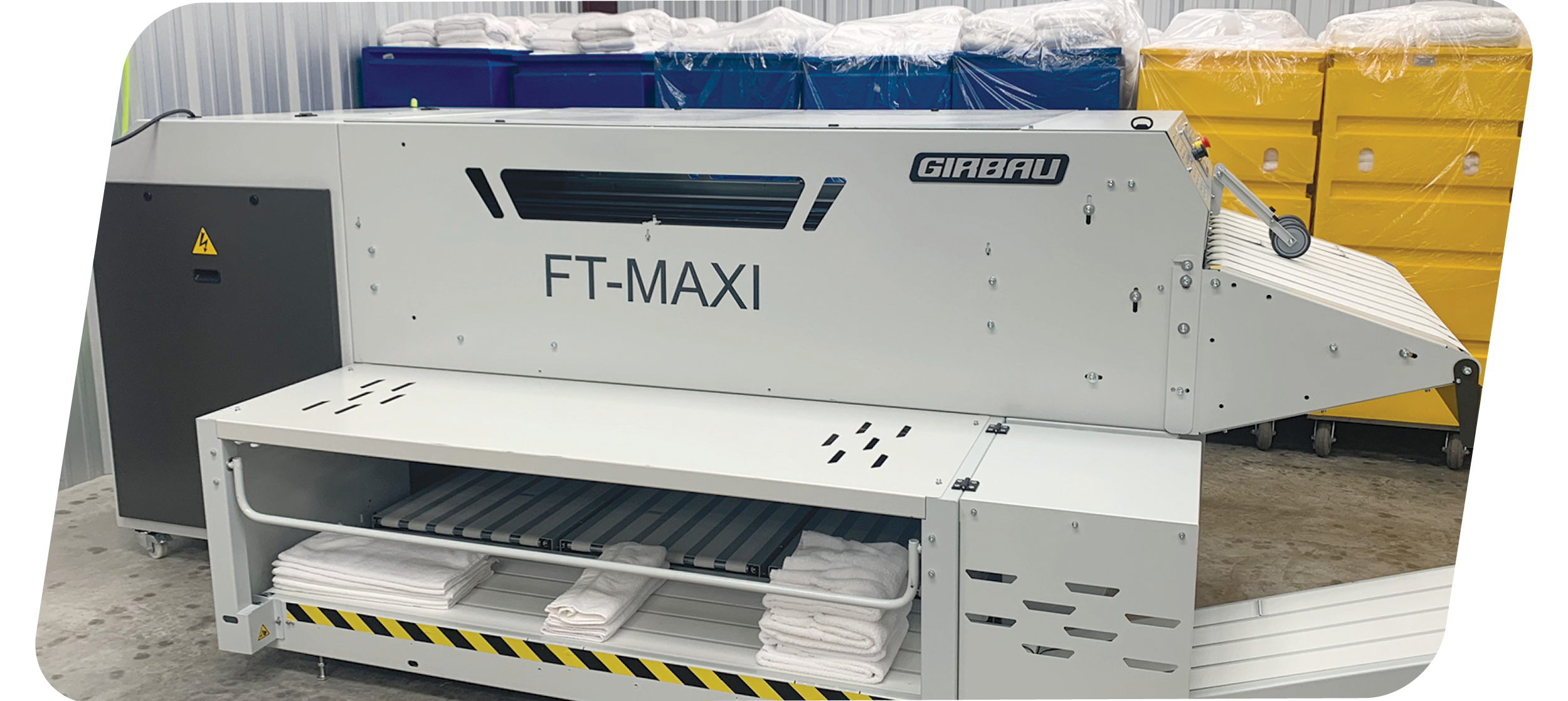As a college student, Craig Myatt spent the summers working as a bartender in a touristy North Carolina beach community. That’s when he noticed a need for clean linens within the vacation rental market. “I started in a garage in 2000. I’d rent sheets and towels, put them into a bedsheet package, and then I’d deliver them to rental properties,” he said.
A Focus on Quality & Service
In the 20 years since, Myatt’s Seaside Linen Rental Co. (Seaside Linen), in Wrightsville Beach, N.C., grew exponentially. Today, Seaside Linen rents beach chairs, umbrellas, bikes and baby strollers, in addition to more than 8,000 pounds of sheets and towels per week. Every piece of linen is washed, sanitized, ironed, folded and packaged in-house.
“As we grew, we encountered linen outsourcing issues that impacted our quality and efficiency,” said Myatt. So in 2016, he brought all laundering in-house using five large-capacity washers and dryers. But with one problem down, another surfaced. “We were hand-folding everything and couldn’t keep pace with our wash production.”
Linen Bottleneck & Automation Solution
To find a solution, Myatt connected with Ben Royal, of Consolidated Laundry Equipment Inc. (Consolidated Laundry), in Charlotte, N.C., and Seth Willer, of Girbau Industrial (GI), in Oshkosh, Wis.
Per their recommendations, Myatt invested in a GI Compact+ 5-in-One. “I couldn’t afford a three-line ironer, nor did I have the space and utility setup for one,” he said. “When Seth put the Compact+ in front of me it was a match made in heaven. It was affordable; ironed and folded fitted and flat sheets; and created consistent folds and stacks.”
Seaside Linen’s new Compact+ automatically feeds, irons, dries, folds and stacks up to 3-sheets per minute (or 180/hour) with a single operator — more with two operators. Additionally, it processes damp linens straight from the washer — without need for dryer preconditioning — by automatically adjusting ironing speed and temperature. Because it’s simple to operate, just one employee is required to run the Compact+ during the off-season. During the busy season, two operators are used; one person feeds linens, while the other off-loads the folded stacks.

Other perks beyond production quickly surfaced as a result of the Compact+, as well. First, because the Compact+ folds king sheets differently than twins, doubles and queens, it simplified the sorting process for employees as they put bedsheet packages together. Second, because the sheets are opened and viewed before feeding them into the Compact+ for processing, more stains are noticed and linens are rejected before they’re dispersed into the field — improving efficiency.
All said and done, the Compact+ significantly streamlined operations, improved production, and enhanced the quality and presentation of Seaside’s product to the customer, according to Myatt. “This created opportunities we didn’t have before,” he said.

Towel Bottleneck & Automation Solution
Suddenly the bottleneck with linens was solved. “Now we had a bottleneck with towels,” said Myatt. “We couldn’t hand-fold quickly enough and consistently enough to match the towels coming out of our washing line.”
He quickly invested in a machine recommended by Willer and Royal — the GI FT-MAXI towel folder. He liked it so much, he installed a second FT-MAXI just 5 months after installing the first.
To use the FT-MAXI, an operator feeds dried towels into the towel folder, where they are automatically classified, folded and stacked at a rate of up to 1,000 pieces per hour. “The FT-MAXI immediately changed production flow,” said Myatt. “We didn’t realize how quickly it folds towels. It forced us to quit hand-folding. The FT-MAXI only requires one operator, is simple to feed, and has improved quality and consistency,” he added.
It also eliminates laundry pre-sorting and associated labor hours. Instead, a variety of dried items can be fed into the machine one after another – where they are automatically folded according to pre-programmed fold specifications, sorted and stacked. With the FT-MAXI, Seaside Linen drastically boosted productivity and operates more efficiently.
Reflecting on the ‘Before and After’
“We would have ordered our second FT-MAXI sooner but the Covid-19 pandemic hit and we were shut down for 6 weeks,” said Myatt. “When we opened back up it was 0 to hero in two hours. A lot of the owners of vacation rentals, who had been doing laundry themselves, came to us because we hygienically sanitize linens. Since we opened back up, our business jumped 125 percent.”
ROI in 3 Years
With his second FT-MAXI now installed, Myatt reflects on the impact of automation on his business. Thanks to the new ironing and folding systems, Seaside Linen outputs a higher quality product, in significantly less time, using drastically fewer labor hours, according to Myatt. “Looking at what I spent outsourcing, I anticipated a return on investment of the equipment in 5 years. Now, I’d say my anticipated ROI is only 3 years.”

